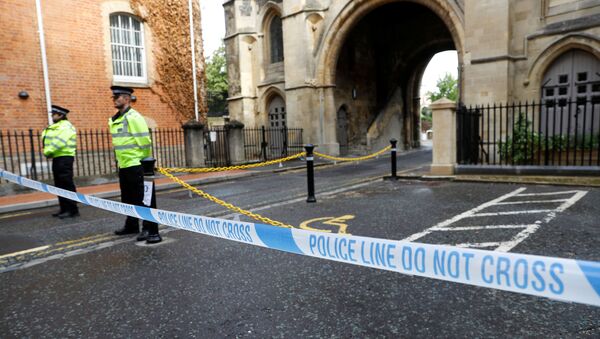Peter Williams, Policing & Terrorism Expert at Liverpool John Moores University and a former police officer reflects on why such attacks have remained possible in the UK and what should be done by intelligence services to track potential terrorists in a more effective way.
Sputnik: The suspect was originally from Libya, and reportedly the security services looked into him last year on the suspicion that he was planning terrorism abroad but found no evidence that he posed a threat. Why do you think such fatal mistakes still occur?
Peter Williams: I think there are potentially a few issues to that answer. I wouldn't say it was a mistake. I think it's too early to say that we've seen this before, particularly in the 2017 attacks here in the United Kingdom where individuals were known to the security services and indeed the most recent ones in London around the turn of the year, London Bridge, all these individuals have been at some stage known to the security services. The issue remains very much on intelligence. All security operations in the United Kingdom and in relation to the police are intelligence-led and the intelligence that they need in response to needs to be current. Now, in this situation, it appears that there was no current intelligence that this particular individual presented a threat. I think the other issue is raised at this stage that we're at an early stage in the investigation as to this individual's motivation. There's been a suggestion, it's only a suggestion within the press that this has been potentially something linked to mental disorder. Now, if that's the case, absolutely nothing in relation to intelligence would make the slightest bit of difference.
Sputnik: What characteristics should an intelligence agency see in order to classify a person as a potential threat?
Peter Williams: We know from the 2017 attacks of two particular reports that were published publicly here in the United Kingdom, one is the Anderson Report of 2017 by David Anderson that looked in particular at London, Manchester and the other, which is probably far more reaching, is the Intelligence and Security Committee report of the House of Commons of Parliament that looked into all the attacks of 2017 and reported in 2018.
Now, those reports detail in some depth the actual process that the security services go through and there's clearly an evaluation process internally.
So in order that the most prominent cases can be prioritized and resources devoted to that priority. Now, I suspect a suspect in this situation that's the process that was undertaken. Now, whether or not there will be a review of that, we will have to wait and see. It's difficult to say.
Sputnik: Should we expect a restructuring of the security architecture in Britain following Brexit?
Peter Williams: Probably not. But I think the major restructure occurred in 2007 following the attacks of 7.7 which were in 2005, for example, regional counter-terrorism units were put in place across the United Kingdom. Now, I think we could show that they've largely been very successful given the number of attacks that they have been able to prevent. So I would imagine that that structure would be considered to be fairly robust and would, therefore, stay in its current situation. I don't envisage any major restructuring whatsoever.
Your listeners may not want to hear this particularly, but I would share this with my students. There's been a 2020 paper published in an academic journal by a very prominent UK academic in the intelligence arena who's widely published. He has looked at the attacks, 2017 - the responses of the security services and drawn a number of conclusions. One of his conclusions is that there will be occasional attacks that are successful. We are to expect that and it is a price we have to pay as we live in a liberal democracy. Now, whether or not people agree with that assertion or not, there’s certainly some evidence base to what Peter Gill says. If anybody wants to refer to his publication, I do think there's a great degree of truth in that. But most important, what you've just asked me is the EU, because I think that is a crucial issue and potentially what it means and the British press is not reporting on this when we leave the EU - we potentially leave Europol and we also lose that intelligence and that will be a crucial factor in terrorist investigations going forward.
Sputnik: What should be done by the British government to prevent this kind of event from happening? And what else needs to happen for the government to finally take action?
Peter Williams: Well, I think the key is intelligence. There are two ways I think of, there are two particular issues that they can look at. One is the fact that because of austerity, we've lost neighbourhood policing teams. So pleased to some extent have lost contact with the day to day work within their communities where the intelligence comes from. That is crucial. On the other, what I've just referred to is on a more organizational level, and that is potentially the loss of access to Europol and the intelligence bases and resources that they have.




